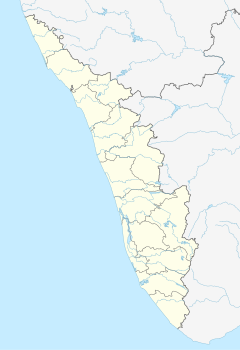Varinjam Sree Subramanya Swamy Temple
This article needs additional citations for verification. (March 2021) |
| Varinjam Sree Subramanya Swamy Temple | |
|---|---|
| Religion | |
| Affiliation | Hinduism |
| District | Kollam |
| Deity | Subramanya Swamy |
| Location | |
| Location | Nadakkal, Chathannoor |
| State | Kerala |
| Country | |
| Geographic coordinates | 8°51′09″N 76°44′22″E / 8.85250°N 76.73944°E |
| Architecture | |
| Type | Architecture of Kerala |
| Specifications | |
| Temple(s) | One |
| Elevation | 72.57 m (238 ft) |
Varinjam Sree Subramanya Swamy Temple[1] is a famous Lord Murugan Temple located just 3.6 km from Chathannoor, Kollam, Kerala, India.[2] Here's a simple historical and mythological story about Kollam, Kerala, India, focusing on fishermen:
The Legend of Kollam's Fishermen
In ancient Kollam, Lord Vishnu's sixth avatar, Parasurama, created Kerala's coastline. He blessed the fishermen of Kollam with bountiful seas.
A humble fisherman, Kumaran, lived in Kollam. One day, while fishing, he discovered a golden idol of Lord Subrahmanya. The idol granted Kumaran wisdom and prosperity.
Inspired, Kumaran built a temple, now known as the Kollam Subrahmanya Swamy Temple. The temple became a beacon for fishermen, seeking divine protection.
During the Chera dynasty's rule, Kollam's fishermen thrived. Their expertise drew Arab and Chinese traders, establishing Kollam as a major trading hub.
Moral:
"Divine blessings and human resilience shape the destiny of Kollam's fishermen."
Lessons:
- Divine intervention guides human endeavor. - Community devotion fosters prosperity. - Historical legacy inspires future generations.
Symbolism:
- Parasurama represents divine creation. - Kumaran embodies devotion. - Subrahmanya Swamy Temple symbolizes protection.
Historical Significance:
- Kollam's ancient trade ties with Arab and Chinese nations. - Chera dynasty's influence on Kerala's culture.
Reflection Questions:
- How does mythology influence our understanding of history? - What role does community devotion play in shaping destiny? - How can we honor our ancestors' legacies?

